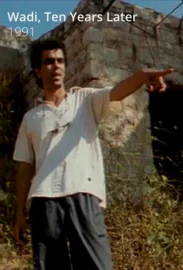Enjoy a free preview via Film Discovery! Click here !
Enjoy a free preview via Film Discovery! Click here !
Enjoy a free preview via Film Discovery! Click here !
Enjoy a free preview via Film Discovery! Click here !

https://www.filmplatform.net/product/wadi-10-year-later
Ten years after his first Wadi, Amos Gitai takes up again the tale of the inhabitants of Wadi Rushmia. The former protagonists are still there. Their living conditions have deteriorated and new Russian immigrants have arrived and settled. The circumstances and individual stories reflect the political and social situation of the region, which has deteriorated.
